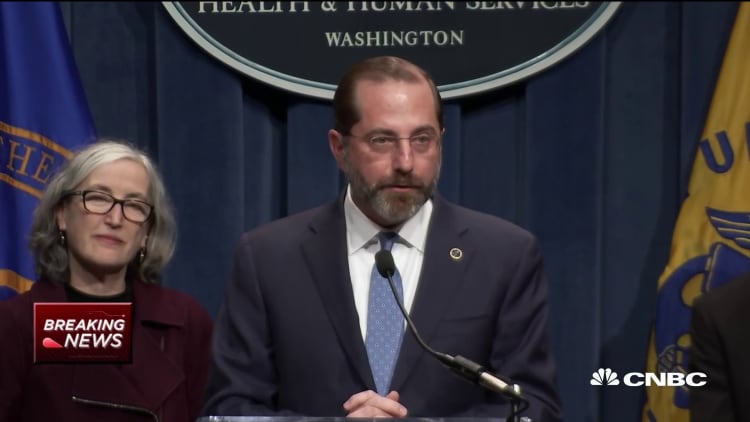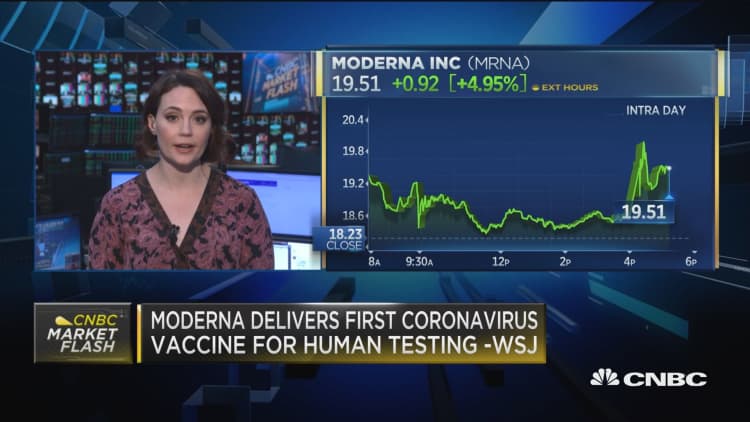Human trials testing a potential vaccine for the COVID-19 coronavirus are expected to begin in six weeks, U.S. health officials announced Tuesday.
"We are on time at least and maybe even a little bit better," Dr. Anthony Fauci, director of the National Institute of Allergy and Infectious Diseases, an agency within the Department of Health and Human Services, told reporters at a press conference. "Hopefully, no further glitches."
The White House reportedly asked Congress on Monday for $1.25 billion in additional funding to bolster its coronavirus response, including money to develop a vaccine and therapeutics to treat the virus. The National Institutes of Health has been working with biotech company Moderna to develop a vaccine using the current strain of the coronavirus.

Hopes to get a vaccine to market are high, but doctors want expectations to be low for how quickly it can happen. Developing, testing and reviewing any potential vaccine is a long, complex and expensive endeavor that could take months or even years, global health experts say. Before researchers can begin human trials, they must have a firm understanding of the pathogen, run safety tests and find enough human volunteers.
U.S. health officials are fast-tracking work on a coronavirus vaccine.
Fauci said Tuesday that the potential vaccine has so far been put into mice and is "immunogenic," or triggers a response in the immune system, suggesting it could fight the virus.
"The gene has been expressed in the platform, in this case, a messenger RNA. The material has been produced, it's been put into mice. It's immunogenic," he said. "It's now getting ready to go through the regulatory issues of getting it to go."
Fauci said a vaccine may not solve "problems in the next couple of months but it certainly would be an important tool that we would have." He said it's possible the virus will prove to be seasonal, thus likely to subside in the warmer months like the flu.
There are currently no proven therapies for the latest outbreak, which has killed at least 2,704 and sickened more than 80,200 people worldwide since emerging from the Chinese city of Wuhan about two months ago.
Local authorities in China have using Gilead Sciences' antiviral drug Remdesivir, which was tested as a possible treatment during the Ebola outbreak, U.S. health officials said last month. Some authorities are also using antiviral drug Kaletra, developed by drugmaker AbbVie, on a "compassionate basis."

Earlier in the day, the Centers for Disease Control and Prevention outlined what schools and businesses will likely need to do if the COVID-19 virus becomes an epidemic outbreak in the U.S.
"We are asking the American public to work with us to prepare for the expectation that this could be bad," Dr. Nancy Messonnier, director of the CDC's National Center for Immunization and Respiratory Diseases, told reporters on a conference call.
The CDC late Monday confirmed 53 cases in the U.S., a majority of which came from passengers repatriated from the Diamond Princess cruise ship that was quarantined off the coast of Japan. The data shows that 36 of the cases are attributed to the cruise ship, three patients were infected in Wuhan and later evacuated to the U.S., and the rest were largely infected while traveling overseas.
Just two cases were contracted through person-to-person contact in the U.S., the CDC said.
Later Tuesday, U.S. health officials said the outbreak will likely become a global pandemic. They also confirmed four new cases from the cruise ship.
"Current global circumstances suggest it's likely this virus will cause a pandemic," Anne Schuchat, principal deputy director of the Centers for Disease Control and Prevention told reporters at a news briefing.
"It's not so much a question of if this will happen any more, but rather more a question of when this will happen and how many people in this country will become infected and how many of those will develop severe or more complicated disease," she added.
CNBC's Noah Higgins-Dunn contributed to this report.


